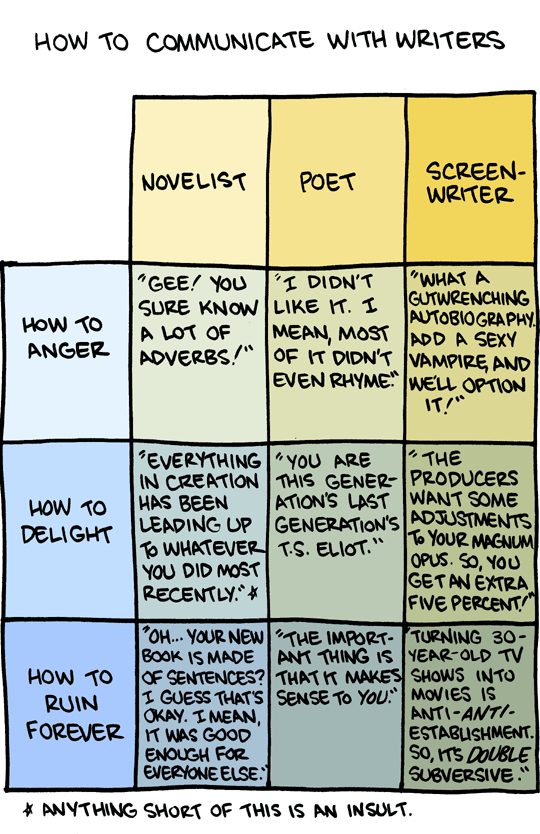We’ve all heard the saying that genius is “ninety nine percent perspiration, one percent inspiration.” Hokey saying aside, it’s interesting to note that these two very different words share the same root. As does aspire, conspire, transpire, respire and
suspire (yes, that’s a word; it’s similar to respire). There’s even something called
interpsiration, which means “spiritual inspiration at intervals.” A million bonus points* for anyone who manages to work that into his/her novel.
It’s interesting that these words can mean breathing, sweating, and receiving ideas. It’s one of those strange things that could only be possible in language. What is this –spire? No, it’s not referring to a tall tower. It’s referring to spirit. In classical Latin,
spiritus means soul, but it’s related to
spirare (now that’s a lot closer to –spire) which means to breathe and is the etymological ancestor of
spirit.
The first spiration word to show up was
inspiration, which appeared in the early fourteenth century. It comes from an Old French word (also inspiration) taken from the classical Latin
inspiritus, the past version of
inspirare. The in- prefix turned “to breathe” into “breath into,” as in, an idea is breathed into a person.
Inspire showed up shortly afterward in the mid fourteenth century, most likely to make a verb for the noun.
The next one to show up was
respire in the late fourteenth century. In classical Latin, it is
respirare, the re- prefix meaning again—to breathe again. Although “again” usually signifies one repeat, in this word it means continual, making respire a synonym for breathe.
Respiration came a little later in the early fifteenth century, just a noun version of the verb. Interesting that you don't hear "respire" much anymore.
Also born in the late fourteenth century was
conspire. It’s from the Old French
conspirer, from the classical Latin
conspirare. Its literal definition (con- meaning together) is “to breathe together.” I’m not sure how it became a word for scheming, but that meaning goes all the way back to the classical Latin version. I guess in a conspiracy, people are talking and breathing together? Maybe?
Transpire has the most interesting story. It first showed up in the 1550’s as
transpiration, another word we don’t hear today. About forty years later,
transpire showed up, but it meant secrete a vapor or liquid. The trans- prefix means through, making the word “to breathe through.” Then in the mid eighteenth century, people began to use it in a figurative sense. Instead of “breathe through,” it was “leak through,” as one might leak information. From that, people started using it as “to take place” and although completely inaccurate to the original meaning of the word, it stuck.
The last one to show up was
perspire in the seventeenth century. The prefix per- also means through, so we have another “to breathe through,” except people used this one to indicate breathing through their pores--
perspration. Physiologically, it’s not accurate, but it referred to what exuded from the skin. And that’s why perspiration means sweat.
Whew!
And
Dictionary.com for suspire and interspire. I never heard of those before!
*Bonus points are not redeemable and subject to change without warning.
